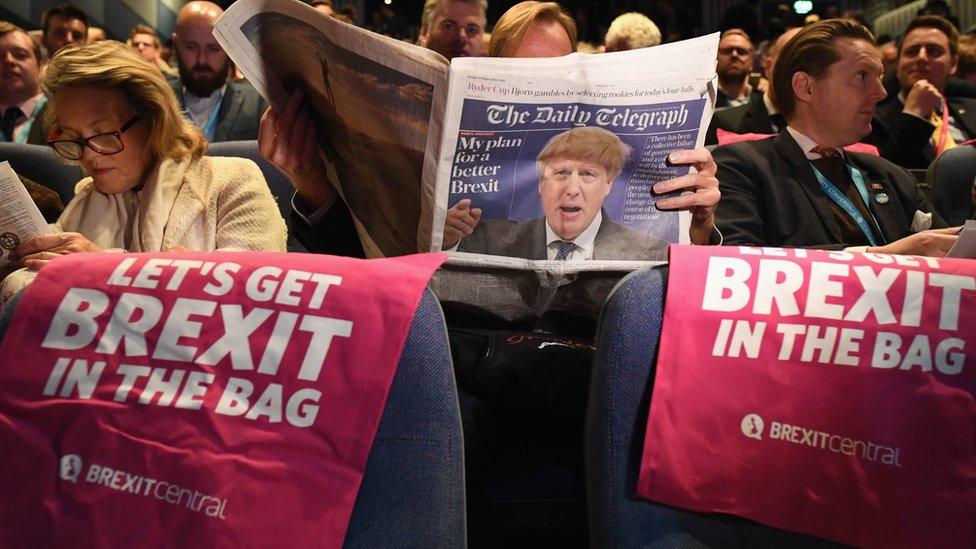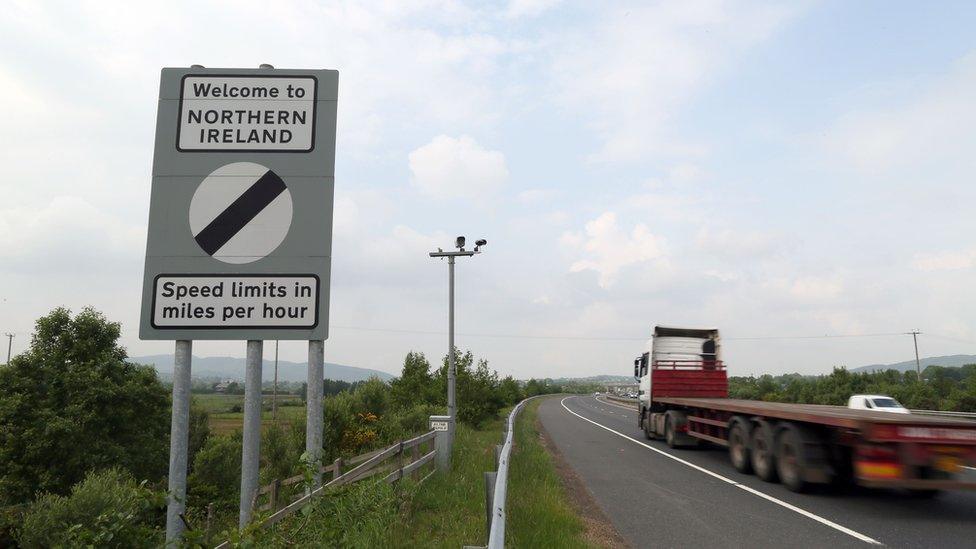Brexit: Why EU negotiators are obsessed with Tory conference
- Published
The prime minister rejects Boris Johnson's claims that she doesn't believe in Brexit
Never, before the UK's Brexit vote, had European makers and shakers taken such a keen interest in domestic British politics. Now, they're hooked.
"It's partly the mad drama of it all," one EU diplomat emphasised to me. "I mean: who knew the British could be so volatile. What happened to the stiff upper lip?"
But many other decision-makers in Europe have persistently pointed out to me the need to "keep an eye" on what UK politicians say about the Brexit process at home, in contrast to what they may agree or seem open to in Brussels.
A famous example of this was former Brexit Secretary David Davis announcing to the UK back in December that a freshly agreed joint EU-UK Brexit report, signed off by Theresa May and the president of the European Commission, was actually nothing but a "statement of intent".
While this weekend, the former Foreign Secretary, Boris Johnson, claimed that the UK's joint commitment with the EU to an Irish border backstop (basically: a fall-back position to avoid a hard border) was explained to him by the Prime Minister and her advisers as merely a "form of words necessary to float the negotiations [with the EU] off the rocks".
Were those really Theresa May's thoughts on the backstop - which is a crucial point in the UK's exit agreement with the EU? Or did she choose to "sell" the backstop to her then foreign minister in that way in order to get him to sign up to her negotiations with Brussels?
Or did Mr Johnson make the whole thing up to grab headlines, put the prime minister under even more pressure at home and throw another big spanner in the works of her negotiations with Brussels?
Bid for breathing space?
Whatever the reality, European politicians' main takeaway is that the UK government has proved to be a somewhat unreliable partner in Brexit negotiations - also fond of posturing at home (a la "Brussels can go whistle for its money") and of catchy but rather empty slogans like "Brexit means Brexit", "red, white and blue Brexit" and "Global Britain".

Delegates at the conference in Birmingham
European watchers of UK politics expect more of the same at this week's Conservative Party Conference.
So why the huge European interest?
Well, it's not so much the details of the conference that mesmerise EU Brexit negotiators but rather what is hoped might follow straight after.
The accepted wisdom in Brussels is that Theresa May couldn't possibly afford to really negotiate with the EU (meaning give as well as take) in the weeks leading up to the Conservative Party Conference.
To have conceded anything more to Brussels, off the back of her Chequers Brexit plan which is much derided within her own party, could have finished her off politically.
So, the Brussels logic goes, the UK Prime Minister will put on a big show of strength for domestic consumption during her party conference - tough on EU migration, tough on foreigners purchasing UK houses, tough on Brussels… in order to buy herself enough breathing space at home after the conference to finish off negotiations in Brussels.
And where are we with that - with so little negotiating time left?
Nothing changed
Well, despite the uproar in the UK following the recent EU leaders' summit in Salzburg, nothing of Brexit negotiations' substance actually changed there.
What was true of negotiations before the summit:
that both sides had advanced massively as regards the UK's exit treaty but that the Irish border remained the key sticking point
that the EU welcomed some points in the Prime Minister's Chequers Brexit proposal, such as her suggestions on future EU-UK security relations, but rejected others, on Ireland and on future EU-UK economic relations
remained the case afterwards too.
The EU insists it will never back away from its commitment to member country Ireland and to the communities both sides of the Irish border to get a legally binding commitment from the UK that no hard border will appear between Northern Ireland and the Republic of Ireland.

The Irish border is focusing minds
This is in order to safeguard the Northern Ireland peace process.
Many European voices tell me they believe that UK negotiators see the Irish border issue as an economic one that can be solved with give and take on both sides, rather than a social, historical issue with the potential for a resumption of violence.
In fact, many in the UK now see the Irish border issue as a constitutional one. The idea that Northern Ireland would follow EU customs rules and regulatory standards, separate from the rest of the UK, after Brexit is seen by some - including the prime minister - as unacceptable.
So can this circle be squared after the Conservative Party Conference?
For appearance's sake?
My EU sources are quietly confident. They point to the potential, written into the Belfast agreement, for more devolution from the rest of the UK.
But there is a distinct possibility that the tone could instead harden further on both sides. Meaning no deal.
Or, just maybe, in the complex world of Brexit, a flare-up or three between the EU and UK between now and the end of the year could actually increase the chance of a successful outcome.
Why?
Because both sides - and Theresa May in particular - need to show how tough the negotiations fight was.
In which case I'd suggest the autumn Brexit timetable could slip.
'Fluid conversations'
EU leaders will decide in a couple of weeks whether enough progress (and I'm told this means progress in atmosphere and intention rather than a resolution of all outstanding negotiation issues) has been made in order to call a special Brexit summit in November.
This could slip to the EU leaders' summit in December calling a Brexit meeting in January (still in time for the UK parliamentary vote on a Brexit deal).
Or, this November, EU leaders and Theresa May will thrash out all the outstanding issues on the withdrawal agreement (notably the Irish border) and on the political declaration outlining the EU-UK post Brexit relationship.
It is do-able. Just.
And it would be what the prime minister always wanted - the European Commission out of the way - just her with her European peers pushing through to a deal both sides are aiming for.
But to increase the chances of getting one, communication between the EU and UK has to be improved. That's something both have learned from the crass misunderstandings on both sides at the Salzburg summit.
"Conversations are fluid now," a high-level contact told me.
"It has to be if we are to reach a deal. We do not need to be face to face with Theresa May or Dominic Raab to communicate. We all know the next EU leaders' summit will have to be carefully co-ordinated between the British and European sides. Unlike Salzburg."
Watch this space.
